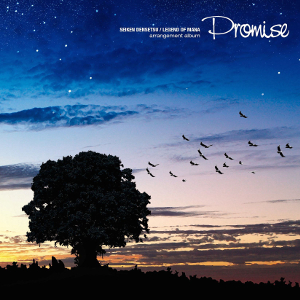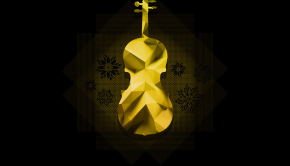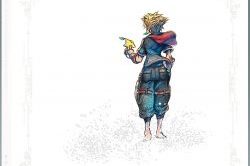Seiken Densetsu -Legend of Mana- Arrangement Album: Promise
 |
Album Title: Seiken Densetsu -Legend of Mana- Arrangement Album: Promise |
| Record Label: Square Enix Music |
|
| Catalog No.: SQEX-10510 |
|
| Release Date: Sep 30, 2015 |
|
| Purchase: Buy at CDJapan |
Overview
The Mana series from Square Enix has always been known for having gorgeous visuals and lush music but comparatively weak gameplay and plot. While the series has its own core fanbase, the series struggled to remain relevant and the last mainline game released was Dawn of Mana for PS2 in 2006. Despite this, the music of the series — especially Final Fantasy Adventure by Kenji Ito, Secret of Mana by Hiroki Kikuta, and Legend of Mana by Yoko Shimomura — remained as fan favorites for all these years.
While Final Fantasy Adventure and Secret of Mana received an arrangement album each, Legend of Mana never got one for years after its release despite its popularity. Even the Re:Birth arrange album that was released to commemorate the series 20th Anniversary did not include any materials from Legend of Mana (since Ito, the arranger of the album, chose to arrange only his own works). Finally, on the 16th Anniversary (strange number) of Legend of Mana’s release, Square Enix announced that an arrangement album titled Promise will be created for the game. While Shimomura served as the producer for the arrangement album, the arrangements were done by other musicians. The album also included arrangements of two tracks from Heroes of Mana, another Mana game composed by Shimomura.
Body
As opposed to the usual orchestral style for albums such as memoria! and Drammatica, both of which are Shimomura’s best of arrangement album and included pieces from Legend of Mana, Shimomura decided to go with a jazzy style for Promise instead. The album starts with “Hometown Domina”, which carries the melody on the piano with a syncopated rhythm with fancy jazz chords, supported by simple bassline and drum rhythm. In the short middle interlude, the solo piano stir up the tempo by making a brief transition into straight time and waltz triple meter successively before reverting back to the main rhythm.
“To the Sea” is a rather obvious choice for this album as the original track is already a Bossa Nova piece. The live instrumentation of the arranged track truly brought the piece alive, with the extended melody performed by the flute. For “Polpota Harbor”, the arranger Takuro Iga, who also performed the piece, decided to just go with a simple solo piano arrangement. While the lusher instrumentation in the original is gone, the piano managed to convey the vibrancy of the piece in a more elegant way with the new arrangement.
The majestic orchestral title theme of the game, “Legend of Mana”, is transformed into an upbeat Bossa Nova track with a swinging rhythm. The arrangement was done in the style of big band with improvised section highlighting the piano, saxophone, and bass. The stark contrast between the arrangement and the original classic theme is refreshing. Unlike the original track with a bombastic opening, the arranged “Picturesque Landscape” started with a repeating plucking pattern by the contrabass before the bandoneon (a type of concertina) joins in with the melody. The violin came in soon after and forms a duet with the bandoneon before the piano takes over the rein for an extended impromptu section.
The new arrangement for “Traveler’s Road” is strikingly different when compared to the original. The original track has a dynamic start in a marching rhythm, while the new arrangement goes in the opposite direction with a new melancholic guitar solo intro. The solo guitar eventually speeds up a bit and switches to strumming chords to accompany the soaring violin carrying the melody supported by the cello. The nuance displayed by the solo violin imbued the melody of the piece with a poignancy not found in the original. The new arrangement of “Singing Wind, Journey’s Path” starts with a guitar and a piano playing the melody in a mellow tempo. Soon the percussion joins in, speeding up the tempo and develops into a new section more akin to the original track, with the flute taking over the melody accompanied by lively strumming guitar chords.
As mentioned earlier, two tracks from Heroes of Mana released on NDS with music composed by Shimomura was also included in this arrangement album. The first one is “Tango Appasionata ~As the Heart Wills~”, which has an arrangement rather similar to the original. Bandoneon and violin leads with the melody accompanied by piano, guitar, and contrabass. There is also an impromptu section featuring the guitar and the piano, followed by an interlude of bandoneon in a deliberately slower tempo in contrast with the rest of the intense track. For the second track, “Such Cruel Fate”, the arranger Jusqu’à Grand-Père chooses a stripped-down approach by using only on guitar and violin. Gone is the pompous vibe of the original, but the new arrangement sounds more sombre and dignified with the combination of the timbres of violin and guitar.
Going back to Legend of Mana, “Seven Shades of Life” is an arrangement of “Bejeweled City in the Ruins”, as indicated in the subtitle of the former. Giving the arranged track a new title is probably appropriate given its vast difference with the original. While the original presents the melody gloomily with strings and piano, the new arrangement is done in a relaxing Bossa Nova style with smoky vocals provided by arvin homa aya. The complete transformation of the melodic line in the new track sung with a swinging rhythm is pretty impressive. Harmonica is also featured prominently in some sections playing an elaborate solo.
“Nostalgic Song” received an extended arrangement and the soaring violin melody in the original is reinterpreted by the piano in a light jazzy style, performed and arranged once again by Takuro Iga, supported by drum and bass. Lastly, the album closes with the beloved ending theme “Song of Mana”. The new vocals, provided by Suika Yonezawa, while sung in the same key, sounds more grounded and earthy than Annika’s voice in the original. The accompaniment in the new track switches few of instruments in the ensemble and adds in syncopation to the rhythm. While the new arrangement does not sound too different from the original, it is still a worthy addition to the album.
Summary
Seiken Densetsu -Legend Of Mana- Arrangement Album: Promise offers a pleasantly refreshing listening experience not found in many of the recent arrangement albums. Instead of trying to build on the original composition and treading familiar grounds with orchestral arrangements, Shimomura and her team of arrangers went with a different stylistic approach to shed new lights on the classic tracks. Shimomura’s choice to produce a jazzy album paid of handsomely as Promise has proven to be an arrangement album worth the wait for fans of Legend of Mana and a delightful treat for listeners not familiar with the source materials.
Do you agree with the review and score? Let us know in the comments below!
4.5
Posted on November 6, 2015 by KT Wong. Last modified on November 7, 2015.














